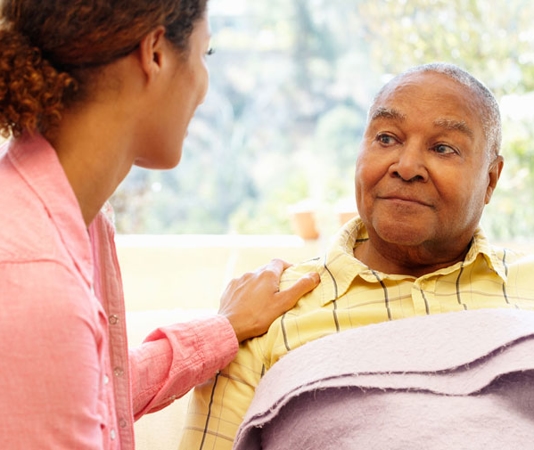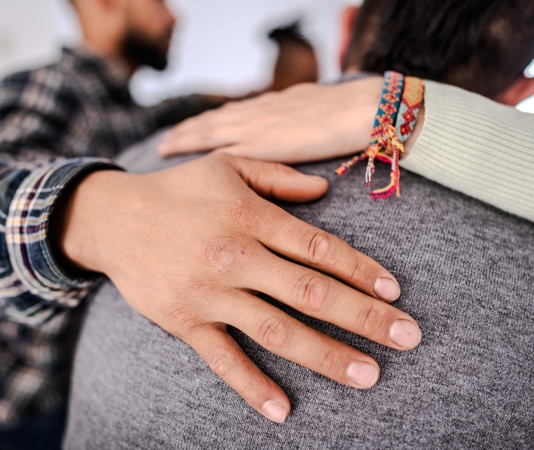During Colon Cancer Awareness Month, it is valuable to learn more about this disease and how it can impact you, and also learn how this disease can lead to unique caregiving needs.
According to the Colon Cancer Alliance, “colon cancer is the third most commonly diagnosed cancer and the second leading cause of cancer death in men and women combined in the United States.” Ninety percent of new cases of colon cancer cases occur in people who are age 50 or older. The sooner colon cancer is detected, the more effective the treatment and higher the survival rate.
All of these statistics matter when it comes to supporting a family member or friend after a diagnosis of colon cancer because it may mean their family is at higher risk (people with a first degree relative who has colon cancer are between two to three times the risk of developing this cancer than those without any family history, the Colon Cancer Alliance states) or what type of treatment they receive and therefore what additional care will be necessary.
“There is still an embarrassment to this disease which prohibits people from talking about it,” explained Jeannie Moore, a co-founder of the Colon Cancer Alliance and their Certified Patient Support Navigator and Community Manager. Ms. Moore has been a caregiver for her mother since her mother’s colon cancer diagnosis 18 years ago.
The Colon Cancer Stigma
The fact that colon cancer can strikingly impact a person’s ability to eat and eliminate in turn leads to isolation and even depression, Ms. Moore pointed out.
“All of a sudden a patient can’t eat, they have gastrointestinal issues, and it adds to the stress,” she said. “They fear going out, having accidents, and then this spirals into loneliness and depression. The quality of life issues can worsen.”
Ms. Moore said that what she has heard about time and time again is that a person going through treatment or living with the after-effects of treatment for colon cancer, will not seek out adequate support simply because of their embarrassment of the diagnosis and functional issues that develop.
“It really depends on the age of the patient,” she said. “Older patients, those in their 50s, 60s or 70s, are too ashamed to explain their situation and suffer in silence.”
However, talking about it can help with prevention and awareness of what is involved in providing care. “My mother’s gift of knowledge of this will keep me from ever getting this disease,” Ms. Moore said.
What Caregivers Need to Know
“My number one advice to caregivers who have a loved one diagnosed with colon cancer is that this is a marathon, not a sprint,” Ms. Moore said.
The reason for this advice is that has seen many caregivers do too much too soon and burnout. “The loved one jumps in and thinks they need to do everything for the other person, while they still continue to go to work, take care of the kids, do the grocery shopping, make it to all of the doctor appointments, and they set themselves up for complete burnout,” she explained. “They are thinking this is for now, but the reality is this is for one year or forever.”
Ms. Moore said that her mother still has issues post-treatment and can end up in the hospital with life-threatening complications. “It doesn’t take long to get in a dangerous spiral,” she commented.
Instead of trying to become a caregiving superhero, Ms. Moore recommends that caregivers create a network of support from other family members and/or professional in home care services and keep it all coordinated through one of many available online resources like Caring Bridge or Lotsa Helping Hands.
“Accept all the help you can with practical things,” she said. “This will extend your energy level as a caregiver much longer. Reach out for help early.”
During Colon Cancer Awareness Month, it is valuable to learn more about this disease and how it can impact you, and also learn how this disease can lead to unique caregiving needs.
According to the Colon Cancer Alliance, “colon cancer is the third most commonly diagnosed cancer and the second leading cause of cancer death in men and women combined in the United States.” Ninety percent of new cases of colon cancer cases occur in people who are age 50 or older. The sooner colon cancer is detected, the more effective the treatment and higher the survival rate.
All of these statistics matter when it comes to supporting a family member or friend after a diagnosis of colon cancer because it may mean their family is at higher risk (people with a first degree relative who has colon cancer are between two to three times the risk of developing this cancer than those without any family history, the Colon Cancer Alliance states) or what type of treatment they receive and therefore what additional care will be necessary.
“There is still an embarrassment to this disease which prohibits people from talking about it,” explained Jeannie Moore, a co-founder of the Colon Cancer Alliance and their Certified Patient Support Navigator and Community Manager. Ms. Moore has been a caregiver for her mother since her mother’s colon cancer diagnosis 18 years ago.
The Colon Cancer Stigma
The fact that colon cancer can strikingly impact a person’s ability to eat and eliminate in turn leads to isolation and even depression, Ms. Moore pointed out.
“All of a sudden a patient can’t eat, they have gastrointestinal issues, and it adds to the stress,” she said. “They fear going out, having accidents, and then this spirals into loneliness and depression. The quality of life issues can worsen.”
Ms. Moore said that what she has heard about time and time again is that a person going through treatment or living with the after-effects of treatment for colon cancer, will not seek out adequate support simply because of their embarrassment of the diagnosis and functional issues that develop.
“It really depends on the age of the patient,” she said. “Older patients, those in their 50s, 60s or 70s, are too ashamed to explain their situation and suffer in silence.”
However, talking about it can help with prevention and awareness of what is involved in providing care. “My mother’s gift of knowledge of this will keep me from ever getting this disease,” Ms. Moore said.
What Caregivers Need to Know
“My number one advice to caregivers who have a loved one diagnosed with colon cancer is that this is a marathon, not a sprint,” Ms. Moore said.
The reason for this advice is that has seen many caregivers do too much too soon and burnout. “The loved one jumps in and thinks they need to do everything for the other person, while they still continue to go to work, take care of the kids, do the grocery shopping, make it to all of the doctor appointments, and they set themselves up for complete burnout,” she explained. “They are thinking this is for now, but the reality is this is for one year or forever.”
Ms. Moore said that her mother still has issues post-treatment and can end up in the hospital with life-threatening complications. “It doesn’t take long to get in a dangerous spiral,” she commented.
Instead of trying to become a caregiving superhero, Ms. Moore recommends that caregivers create a network of support from other family members and/or professional in home care services and keep it all coordinated through one of many available online resources like Caring Bridge or Lotsa Helping Hands.
“Accept all the help you can with practical things,” she said. “This will extend your energy level as a caregiver much longer. Reach out for help early.”



.1803151925550.jpg)

